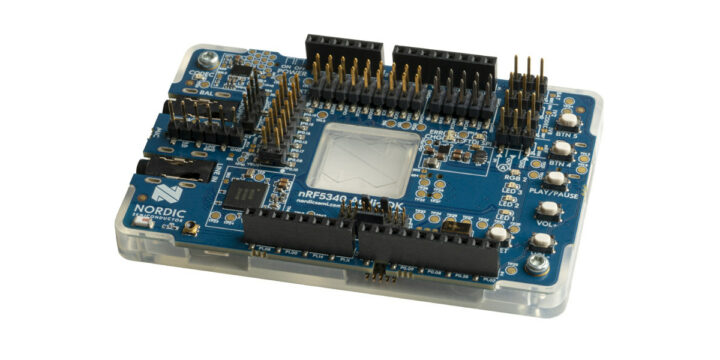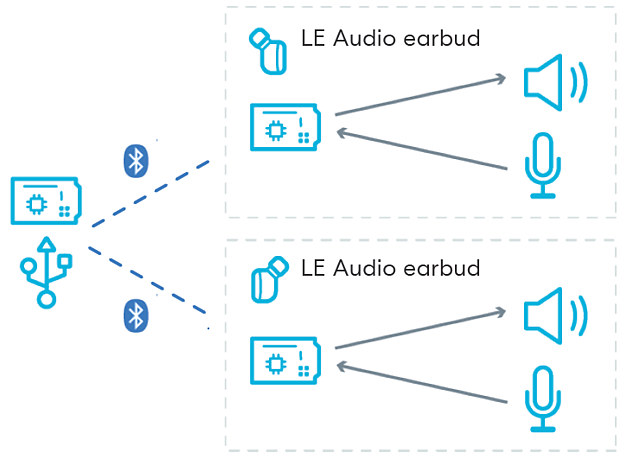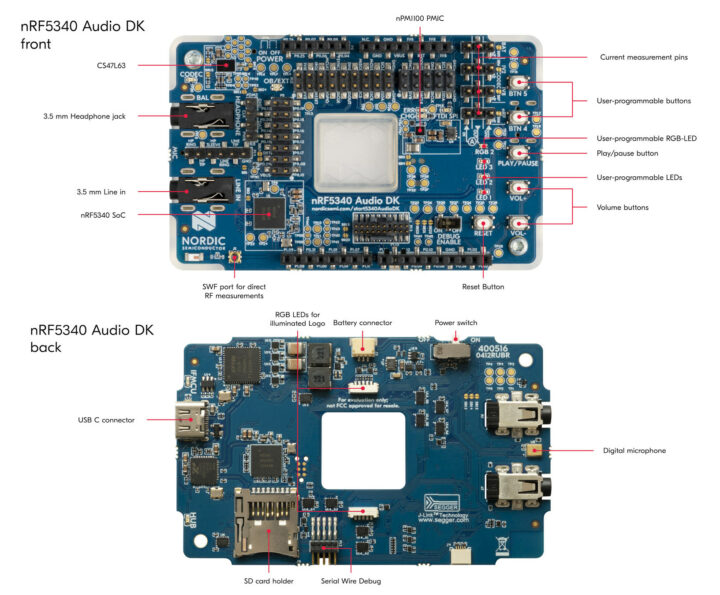Nordic Semiconductor nRF5340 Audio DK is a Bluetooth LE audio development kit that enables better audio quality with LC3 codec, longer playtime, and new features such as Multi-Stream Audio and and Broadcast Audio.
Equipped with the nRF5340 dual-core Cortex-M33 SoC, nPM1100 PMIC, and Cirrus Logic’s CS47L63 Audio DSP, the kit can be configured as a True Wireless Stereo (TWS) earbud, an LE Audio USB dongle, an enterprise headset, or a broadcast receiver.
 nRF5340 Audio DK specifications:
nRF5340 Audio DK specifications:
- WiSoC – Nordic Semi nRF5340 dual-core Arm Cortex-M33 multi-protocol microcontroller with support for Bluetooth 5.3 LE, Bluetooth mesh, NFC, Thread, Zigbee, 802.15.4, ANT, and 2.4 GHz proprietary; 1 MB flash and 512 KB of RAM for the 128 MHz application core, and 256 KB Flash and 64 KB RAM for the 64 MHz network core.
- Storage – MicroSD card holder
- Audio
- Cirrus Logic Audio DSP CS47L63
- 3.5mm mono headphone jack, 3.5mm stereo analog Line IN jack
- PDM Digital microphone
- Bluetooth LE Audio support
- RF
- 2.4 GHz antenna
- SWF RF connector for direct RF measurements
- Expansion headers
- Misc – Power on switch, 5x user-programmable buttons (Volume, Play/Pause, etc…), 4x user-programmable LEDs, RGB LEDs
- Debugging – SEGGER J-Link debugger, pins for measuring power consumption
- Power Supply
- 5V via USB Type-C connector
- Battery connector and 1500 mAh capacity (included in the kit as I understand it)
The company specifically made a developer release of the nRF Connect SDK v1.9.99-dev available with support for the nRF5340 Audio DK, which can be used until the nRF Connect SDK v2.0 is released. The SDK supports the development of Bluetooth LE Audio, Bluetooth Low Energy, Thread, and other applications. It integrates the Zephyr RTOS, protocol stacks, samples, hardware drivers, and more. You’ll find resources to get started on the documentation website.
Since there’s basically no consumer hardware for Bluetooth Audio LE right now, you’ll need at least two boards to get started, or even a minimum of three for features like multi-stream and broadcast audio. The nRF5340 Audio DK is available from distributors for about $170, so a complete 3-board kit would amount to a little over $500. That’s not small change, but still a better deal than the $2,000 Bluetooth LE devkit based on nRF52840 SoC that we covered last March.

More details can be found on the product page, and the company will be hosting a webinar on LE Audio on the 18th of May explaining the differences between Bluetooth Classic and LE Audio, the major advancements made by LE audio, and new use cases.

Jean-Luc started CNX Software in 2010 as a part-time endeavor, before quitting his job as a software engineering manager, and starting to write daily news, and reviews full time later in 2011.
Support CNX Software! Donate via cryptocurrencies, become a Patron on Patreon, or purchase goods on Amazon or Aliexpress





